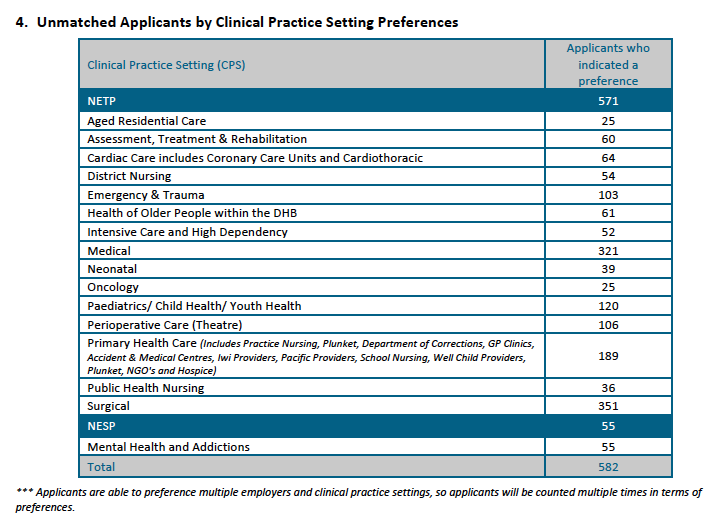More than 50 new graduate nurses keen on mental health nursing failed to win places in the first job match round, according to the latest report on the November job round.
Overall 582 (43 per cent) of the 1389 applicants found out on November 22 last year that they were unsuccessful in the first job match. While most of the unsuccessful applicants were seeking surgical or medical nursing positions, the latest ACE report shows a high proportion of graduates seeking mental health and addictions, aged residential care and primary health care roles were also unsuccessful.
Hilary Graham-Smith, professional services associate manager for the New Zealand Nurses Organisation, said yesterday that hundreds of graduates missing out on jobs was unacceptable considering the national nursing workforce goal was 100 per cent placement by 2018.
The ACE Nursing Algorithmic Match Report provides a breakdown of the 913 jobs on offer and the 775 new graduates matched with jobs on November 10 in the end-of-year round of the ACE new graduate nurse job-matching process. In all, 57 per cent of the 1389 applicants found out on November 22 that they had been offered positions on Nurse Entry to Practice (NETP) and Nurse Entry to Specialist Practice (NESP) programmes. At least 138 positions were still to be filled as at November 10 and historically more graduates are also offered jobs over the summer break as vacancies arise leading up to NETP and NESP programmes getting underway in late January/early February this year.
Graham-Smith said the overall trend in new graduate jobs for nurses showed no significant increase. “This is not the case in medicine: every new graduate doctor has a place on an entry programme. This speaks to the chronic under-investment in nursing and a complete lack of progress on guaranteeing all new graduates of a place on a programme by 2018,” she said.
She said Health Workforce New Zealand head Des Gorman has called it a “perfect storm” as nursing has gone through a long period of under recruitment and training. “This matches our research on nursing employment. We have an aging workforce and over-50s leaving. We are simply not attracting, training or retaining enough nurses to future-proof our healthcare services,” she said.
Concern was expressed last year about shortages and high vacancies for acute mental health nursing positions. The ACE match report shows that 55 of the 210 applicants who expressed interest in the NESP programmes for mental health and addiction nurses were unsuccessful.
In addition, 25 of the 39 nurses who indicated a preference for aged residential care and 189 of the 359 who were keen on primary healthcare positions (which include practice nursing, prison nursing, Plunket and hospice positions) were unsuccessful in the first job round.

The DHBs in which it was hardest to get jobs (i.e. which turned away the highest proportion of applicants who had put that DHB down as their first preference) included Hutt Valley, Mid-Central, Capital & Coast, Waikato, and Auckland, which accepted between 28 to 42 per cent per cent of the first-preference applicants (see table at bottom of article for the number of jobs on offer).
Ethnicity and second-time-around job rates
The percentage of Māori and Pacific nurse graduates offered jobs on November 10 was again slightly higher than the average job success rate at 70 per cent (145 of 206 applicants) and 63 per cent (54 of 85 applicants) respectively, compared with 57 per cent for all applicants.
Asian applicants were once again the least successful in obtaining job offers, with just 39 per cent (86) of the 220 applicants being offered a job in the first round. The job rate for the ‘other’ ethnicity category (largely Pākehā/European) was the same as for all applicants – 57 per cent – with 490 of the 846 applicants being successful.
The vast majority of the November applicants were first-time-round applicants and 60.5 per cent of those applicants were successful. Just over 35 per cent of the 115 second-time-round applicants were successful and 26 per cent of the 49 applicants applying for a third time or more.
The ACE Nursing Intake Summary Report was prepared by the agency TAS (formerly known as DHB Shared Services), which owns ACE Nursing on behalf of the 20 DHBs.
The next ACE report is not due until after the National Talent Pool, from which DHBs can employ unmatched new graduate applicants, closes in late June.
Report author Kamini Pather said there was a lot of dynamic change to ACE daily statistics as applicants get offered jobs, withdraw from the talent pool for other reasons or change their preferences. This meant there were only two points in the recruitment cycle where stable and reliable data could be extracted. Those were at the time of the electronic match (November 10) and once the National Talent Pool and end-of-year intake closes, which is about seven months later in late June.
| Employer | Positions submitted to ACE Nursing for End of Year Match | Total Applicants Matched to Employer (as at Nov 10 2017)
|
| Auckland DHB | 107 | 79 |
| Bay of Plenty DHB | 49 | 49 |
| Canterbury DHB | 112 | 100 |
| Capital & Coast DHB | 65 | 56 |
| Counties Manukau DHB | 97 | 80 |
| Hawke’s Bay DHB | 32 | 29 |
| Hutt Valley DHB | 14 | 14 |
| Lakes DHB | 17 | 17 |
| MidCentral DHB | 19 | 14 |
| Nelson Marlborough DHB | 37 | 37 |
| Northland DHB | 24 | 22 |
| South Canterbury DHB | 15 | 13 |
| Southern DHB | 58 | 53 |
| Tairawhiti DHB | 10 | 10 |
| Taranaki DHB | 23 | 21 |
| Waikato DHB | 94 | 66 |
| Wairarapa DHB | 4 | 4 |
| Waitemata DHB | 97 | 78 |
| West Coast DHB | 5 | 4 |
| Whanganui DHB | 18 | 18 |
| Southern Cross Hospitals – Auckland | 7 | 3 |
| Southern Cross Hospitals – Midland (Waikato & BoP) | 3 | 3 |
| Southern Cross Hospitals – Southern (Christchurch) | 6 | 5 |
| Total | 913 | 775 |
















